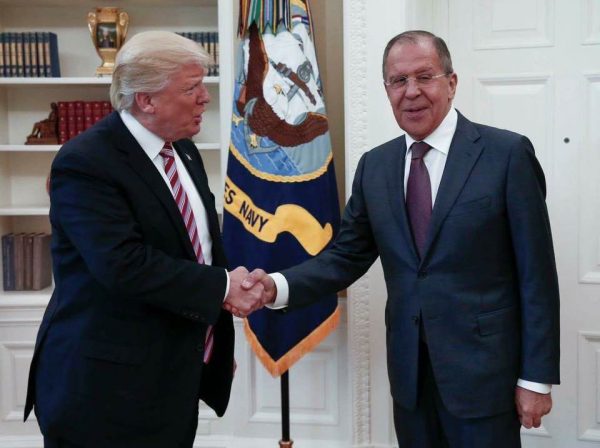
By Josh Rogin
President Trump’s Wednesday meeting with Russian Foreign Minister Sergei Lavrov at the White House was not primarily about sanctions or Crimea or even Russian interference in the 2016 election. According to Trump, the U.S. government now looks favorably on the Russian-Iranian-Turkish plan for Syria.
The problem is that plan is highly likely to fail and result in the continued, if not increased, slaughter of Syrian civilians — only this time the United States will be directly complicit.
Trump said he had a “very, very good meeting” with Lavrov, telling reporters that both sides want to end “the horrible killing in Syria as soon as possible, and everybody is working toward that end.”
Sitting next to former secretary of state Henry Kissinger, who has been acting as a back channel between Trump and the Russian leadership, Trump seemed to rave about the cease-fire agreement that Russia, Iran and Turkey struck through what’s known as the Astana process.
“We’re talking about Syria, and I think that we’re going to do very well with respect to Syria and things are happening that are really, really, really positive,” Trump added. “We’re going to stop the killing and the death.”
The memorandum that Russia, Iran and Turkey signed in Astana last week calls for the establishment of “de-escalation areas” inside Syria that would provide for a reduction in violence, improvements in humanitarian conditions and an environment that might lead to a resumption of a political process.
Among the many shortcomings of the plan, however, are that large parts of these safety zones would be patrolled by Russian and Iranian forces, who have participated in the Assad regime’s campaign of atrocities. Also, there are no enforcement mechanisms if the regime and its partners don’t comply.
“This leaves the door open for regime and Russian forces to continue bombing hospitals, schools, and bakeries while claiming that they are ‘targeting ISIS and [al Qaeda]’ as occurred in past ceasefire agreements,” the Syrian American Council, a group that represents the opposition, said last week.
The Astana plan is a “transparent attempt by Russian President [Vladimir] Putin to hijack the Trump Administration’s ongoing deliberations concerning Syrian safe zones,” the group said. “President Trump should demand a better deal.”
The Syrian opposition walked out of the Astana talks when the deal was struck.
The official White House readout of the Lavrov meeting said Trump underscored the need for Russia to “rein in” Syrian President Bashar al-Assad, Iran and Iranian proxies. But the administration has said nothing about how it plans to get Russia to comply.
Without real leverage on Russia and the willingness to use it, there’s little chance Moscow will do what’s necessary to stop Assad’s ongoing slaughter of his own citizens, said former ambassador Frederic Hof, who was a top State Department Syria official in the Obama administration.
“For this Russian de-escalation scheme to work, the Russians have to understand clearly that the U.S. will react in ways similar to the strike in April, if the regime, and for that matter the Russians, resume their mass violence campaign,” Hof said.
Russia has been targeting civilians and civilian facilities such as hospitals in opposition held areas. Moscow also defended the Assad regime from blame in the chemical weapons attack that killed dozens last month in Idlib province.
One huge risk of endorsing the plan without enforcement is that the Assad regime and Russia might feel secure to perpetrate mass violence against civilians in any place not covered by the agreement, said Hof. That will prompt more extremism and prolong the conflict.
“If the Russians and the regime believe they still have a free ride to do things in areas not mentioned in this memo, it will be a victory for al-Qaeda, ISIS, Assad and Iran,” he said.
Speaking on CNN’s “The Lead” Tuesday, Senate Foreign Relations Committee Chairman Bob Corker (R-Tenn.) held out hope that Russia might abandon its alliance with Assad and join with the United States to bring peace and comity to Syria.
“What we have now is a situation where Russia has a window of opportunity,” Corker said. “I know that [Secretary of State Rex Tillerson] is exploring that right now, and do they want to stay aligned with this barbaric ruler who is torturing his people in prisons?”
Corker is falling into the same trap as Trump, believing that the United States needs to test Moscow’s willingness to do the right thing in Syria. That’s exactly what President Barack Obama and Secretary of State John Kerry did for years as they tried and failed to cajole the Russian government to stop helping Assad murder civilians.
Six years into this bloody conflict, the test results are in. Russian and American interests in Syria are not the same. Putin is not going to abandon Assad. Only with increased U.S. commitment to leading the diplomacy, pressuring the bad actors and supporting the opposition can a credible and sustainable political process even begin.
The Trump administration is not guilty of collusion with Russia in Syria, at least not yet. But it is creeping in that direction.
WASHINGTON POST

Leave a Reply
You must be logged in to post a comment.